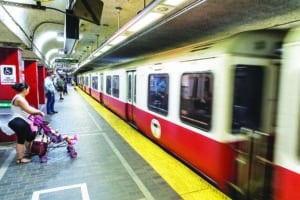After resisting calls to change course for months, the MBTA embarked on a scramble Monday to reverse service cuts across all modes in the coming months using hundreds of millions of dollars in emergency federal aid.
The T’s Fiscal and Management Control Board voted to restore subway and bus service to pre-pandemic levels, resume weekend commuter rail service on lines where it was suspended, and begin running ferries again, all with an unspecified but urgent timeline of “as soon as possible.”
MBTA General Manager Steve Poftak said at the board’s meeting that the agency expects to receive at least $845 million from the American Rescue Plan – on top of the $1.1 billion the MBTA received in prior federal stimulus packages – putting it in “a much different landscape” than when T officials planned and approved the unpopular service cuts.
“We are bringing back service as fast as we possibly can on bus and subway with the goal of getting to 100 percent of pre-COVID service levels,” Poftak said. “Funding is not the constraint right now to building back service.”
The FMCB voted 3-0 in favor of the changes. Members Chrystal Kornegay and Tim Sullivan abstained.
The service change amendment calls for restoring service as rapidly as the T can, but the timeline is unclear.
One obstacle is staffing: Poftak said the MBTA, which did not lay off workers, continues to face significant employee absences because of COVID-19 impacts. As of Monday, more than 40 staff are actively ill with the virus, and Poftak estimates there are twice as many who are unable to work while awaiting test results or quarantining.
Hiring to fill positions vacated during the pandemic has also been slow, so the agency needs to “play catch-up,” Poftak said.
“If the question is when will we get to 100 percent of pre-pandemic bus service, I don’t have a specific answer to that,” he replied when FMCB Vice Chair Monica Tibbits-Nutt asked when bus service will return. “We’re still trying to figure out how to get people trained and what the protocol for group trainings is going to be.”
MBTA ridership and the fare revenue it brings plummeted when COVID-19 hit, and more than a year into the pandemic, it still lingers around 30 percent of pre-pandemic averages. Gov. Charlie Baker has argued it is “bad public policy” to run a full suite of service for such low ridership.
The FMCB in December narrowly approved a package of cuts that slashed trip frequency by 20 percent on the Red, Orange and Green Lines and non-essential buses, cut frequency by 5 percent on the Blue Line and essential buses, closed 20 bus routes, suspended weekend commuter rail service on seven lines, and ended Charlestown and Hingham direct ferry trips.
Commuter rail and ferry changes took effect in January, while most bus and subway cuts hit this month.
Lawmakers, advocates and riders have criticized the MBTA for months for implementing the cuts while receiving nearly $2 billion in federal emergency funding. The congressional delegation increased pressure in recent weeks, with members arguing that the T stashing away stimulus to address future budget gaps goes against the spirit of the aid.
In a Monday statement, the Transit is Essential coalition that has been vocally fighting the cuts praised the latest vote as “steps in the right direction.”
“The service cuts have set back our region — the need to restore service and build back better is now more urgent than ever,” the coalition said. “The MBTA’s presentation also made clear that we must continue to invest in the system for the long-term. The T has been chronically underfunded – and federal support will not alone solve this challenge. The Massachusetts Legislature must now reenergize to provide additional resources for the T and transportation statewide.”







